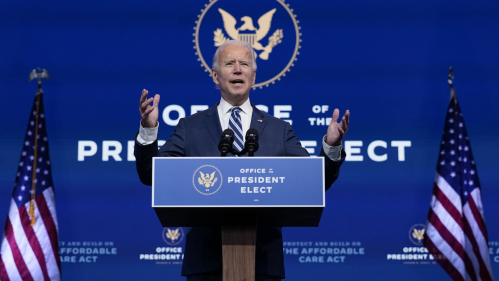With Joe Biden’s Inauguration, Country Marks Another Transfer of Power

At noon today, Joe Biden will be sworn in as the 46th president of the United States following one of the most fraught transition periods in our history. This moment might have seemed in doubt on January 6 when a mob of rioters stormed the U.S. Capitol as Congress began to certify the election results. David Greenberg, a professor of history in the School of Arts and Sciences and journalism and media studies in the School of Communication and Information and an expert on American political and cultural history, including the presidency, talked to Rutgers Today about today’s presidential transfer of power in a time of political unrest.
Can this be considered a peaceful transfer of power considering the turmoil in the last two weeks?
Yes, we can call it a peaceful transfer of power, despite everything. In the end Trump left on his own volition, there was no credible challenge to the election outcome, and – when you think about it – pretty much all the key people involved except for Trump did the right thing. Vice President Mike Pence, Majority Leader Mitch McConnell, the acting Defense Secretary, many state election officials, the Supreme Court, Trump-appointed judges – all of them defied the predictions of the doomsayers and, in their moments of reckoning, went against Trump and sided with reality and the Constitution.
Except for a few minutes on January 6, when it became clear that the police did not have the riot under control, I didn’t doubt that democracy would ultimately prevail. But of course it was frightening to watch the assault on the Capitol.
Donald Trump leaves office after being impeached for the second time in the final days of his administration and is facing a senate vote to convict that could prohibit him from holding federal office again in the future. How do you think this chapter is going to be viewed by future historians?
It's always hard to predict how future historians will view a situation we’re experiencing in real time – especially one as emotionally fraught as this one. I would guess, however, that Trump’s role in fomenting the violence of Wednesday, January 6 was so egregious that anyone looking back on it will understand why Congress felt compelled to impeach him a second time.
Do you think there need to be changes in the presidential transition process, such as shortening the length of time between administrations, to help ensure an outgoing president doesn’t prevent roadblocks for a successor in the future?
I think the problem was Donald Trump, not the process. Having two and a half months is actually helpful to make sure a new administration is able to hit the ground running. With almost every other president in our history, it has worked out all right. I do think Congress should pass a law clarifying the Electoral Count Act of 1887. That law places the responsibility of resolving election disputes on the states and prescribes how Congress opens and counts the Electoral Votes once they are cast. This year, some Trump supporters were claiming that Congress has more freedom to reject duly cast Electoral Votes than it actually does. Revising the law would ensure that there is not even a shred of ambiguity as to how the next president is decided.
President Trump said he will not attend the inauguration, but Vice President Mike Pence will be there. Do you think Trump's decision further casts a shadow over the inauguration and transfer of power?
Deciding not to attend the inauguration is probably the best decision Donald Trump ever made.
What do you think the country needs to learn from the recent political unrest and turmoil since the election? Are you surprised that any of this happened and do you think there will be sufficient reforms to protect our democracy?
I was surprised, of course, and anyone who says otherwise is being disingenuous. The Capitol had not been stormed since the War of 1812, and that was by a foreign power.
The easy reforms will be to address the failures of security, without which the assault would not have happened. After 9/11, we implemented a lot of common-sense bipartisan fixes, and we need a deep investigation and similar remedies here. The harder part will be how to address the rise of right-wing extremism – as well as left-wing extremism – which has been facilitated and accelerated by social media. I don’t have an easy answer there, but between the assault on the Portland courthouse and the burning of police stations last summer that took advantage of largely peaceful protests against police violence sparked by the death of George Floyd, and now this much more violent storming of the U.S. Capitol, it’s clear that ideological or even just discontented mobs have been using the internet to radicalize, organize, and mobilize their movements. Addressing this will be a long-term undertaking.


